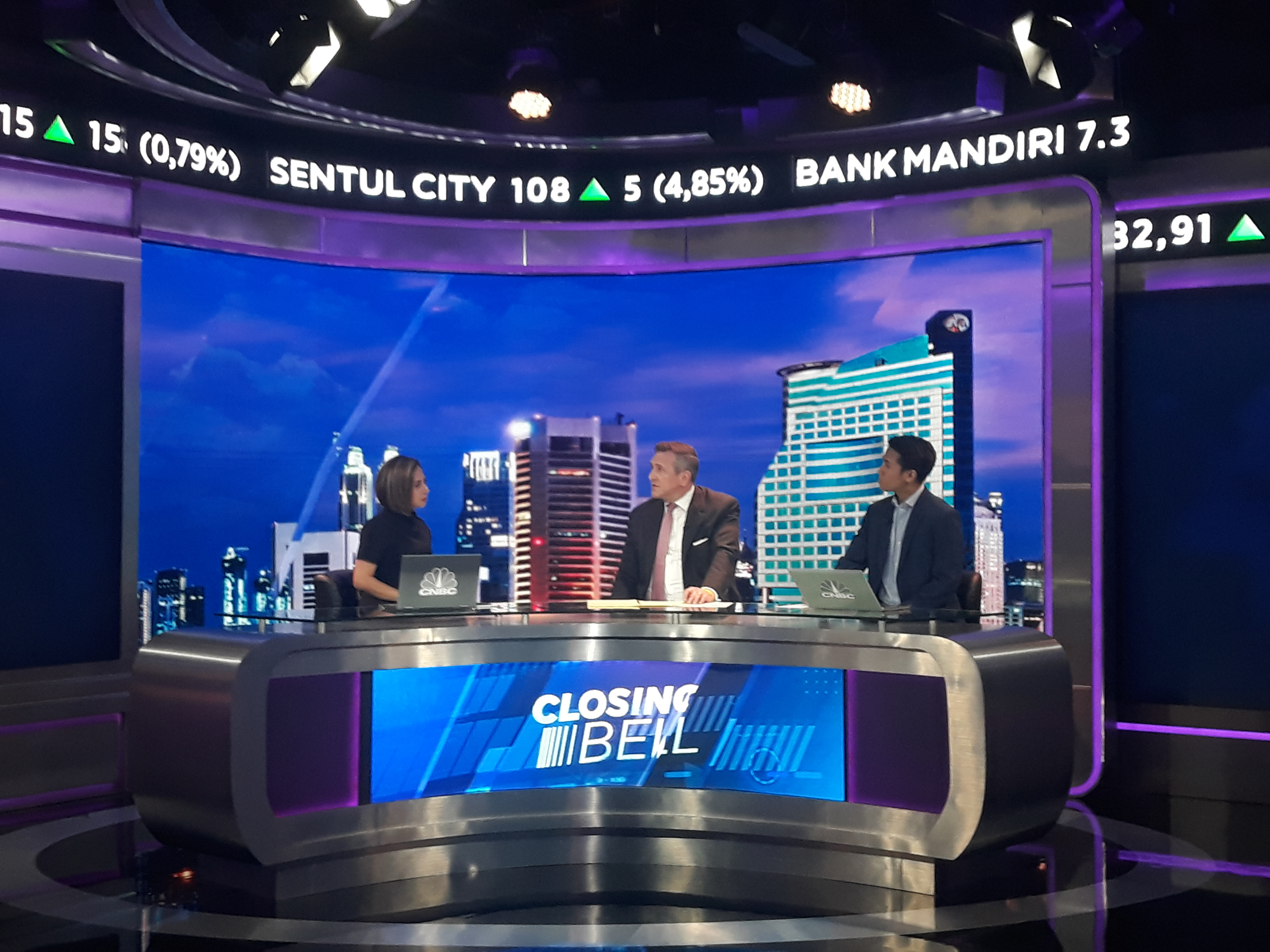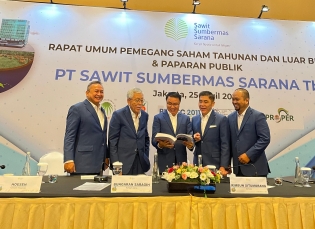CFO of Sawit Sumbermas Concerning the Pressure of the CPO Industry and Layoffs

Wangi Sinintya Mangkuto, CNBC Indonesia
November 23, 2018
The crude palm oil (CPO) industry is under pressure due to sluggish prices, weakening demand, and abundant stocks.
Indonesia as the largest producer of CPO in the world also feels the impact.
Indonesian Palm Oil Association (GAPKI) stated that in January-September 2018 the export volume of palm oil (crude palm oil, palm kernel oil, and derivatives) fell 1% compared with the same period last year, from 23.19 million tons to 22.95 million tons.
Meanwhile, production continues to increase domestically. Increased production and stagnant exports make palm oil stocks in Indonesia rise to 4.6 million tons. This has an impact on weakening prices.
The CFO of PT Sawit Sumbermas Sarana Tbk (SSMS), Nicholas J. Whittle, acknowledged that prices were indeed under pressure.
To CNBC Indonesia, following Nicholas's explanation related to why CPO prices reached their lowest level.
CI: CNBC Indonesia
NJW: Nicholas J. Whittle
CI: from data, the CPO price dropped very deep even up to 20 percent.
NJW: It is true that during this year 2018 has decreased around 20%, there are several factors both on the demand side and also on the supply side, especially here in Indonesia.
CI: Whether these are directly impacted by the performance in the third quarter of 2018?
NJW: If we look at the story during this year there are indeed several parts on the demand such as there is the issue of tariffs in India around April and trade issues between the United States and China, as well as the pressure on the oil industry for small parts of the demand side of the supply side.
This year national production in Indonesia has increased significantly, I think in terms of sector or in terms of analysts, we are waiting for national production for full year in 2018 between 39 to 40 million tons of CPO.
CI: Does this also relate to the B20 policy that the government implements whether it does not compensate enough, for example with the current condition of prices which weakened demand which also decreased?
NJW: I think we have not seen the full impact, we begin to see the impact of the numbers we make inside the company. We are waiting in 2019, probably between 6 to 7 million tons withdrawn from the supply needs to increase B20 biodiesel demand.
CI: Does that mean there will be 6 to 7 million tons?
NJW: In total, we are hope and waiting to be able to give support to prices, and if we look at the chart, my colleagues and I agree with the opinions that are on the market today.
CI: Is it until the end of the year whether the CPO price will still persist above?
NJW: Actually, if I can give the exact price of CPO in the future I will be a rich man. My hope is that we've all been to the lowest level in this November. I'm not waiting for a big increase in December but it's stable, hopefully we can stabilize above the level of 2000 ringgit per ton.
CI: on the other hand, India has already raised its import tariffs and throughout the year Indonesian exports to India is depressed by 34% and then the pressure will continue.
NJW: I think we have seen recovery in terms of exports, of course the total compared to last year's total fell slightly but that is also possible from the supply factor, in 2018 we see recovery in plantations in Malaysia from supply coming from Malaysia has gone up, possibly for this year Malaysia's national production is between 19 and 20 million tons, so that it puts pressure on our national production in Indonesia.
If we see that our production is very productive, we will continue to rise this year and if the weather is good in 2019, the hope for our national production will also have strong production, so in my opinion the pressure will come from the supply side not from demand.
Of course there are factors in the export market particularly, global political factors for traders but if there is strong production in the Indonesian sector it will give a limit to next year's price increase, however we see prices going up next year and we wait for prices of 550 to 580 (in US dollars) in 2019, so we are waiting for a price increase at the current level
CI: Where did the optimism come from?
NJW: Optimism arises in terms of the stock will start to descend, and from our company support a lot for the moratorium for additional land, so we have begun to have a considerable decline in the additional level of plantations, hopefully we will see a more balanced situation between demand and supply next year.
CI: We know that the current conditions were challenging, Sawit Sumbermas is targeting CPO up to 400 thousand tons, is it still consistent in that number?
NJW: Indeed, there are challenges one of which is the condition of the market and price conditions. Companies remain focused to raise production. Investments that have been made over the past few years will only show productivity in the future, we must work hard to maintain and increase the level of productivity on our plantations. Seen from the palm oil sector, investment in maintaining the plantation can have challenges as well.
Most importantly we maintain the health of our existing trees, even though there is no investment during the period like now but the impact can be for future periods, we still have to work hard for it.
CI: Will still build 3 more mills in Kalimantan?
NJW: We are going to build 3 more mills because of the yield level in the area, we already need more processing capacity.
CI: Will the three palm oil mills be completed in 2019?
NJW: Yes, right.
CI: How far these new mills push the company's performance?
NJW: Each factory has a capacity of 60 tons per hour.
CI: Sawit Sumbermas actually has a very high productivity of 5.1 tons per hectare, which is above the Indonesian industry with an average of 2 to 3 tons, so the yield per hectare is good, hence we need this additional mills, then the question is that if it has been proceed will automatically be sold?
NJW: It must come from the field to market, right.
CI: With that condition, is there a plan to diversify the market or still try, besides the three countries so that the production can be sold?
NJW: Of course we continue to work to open up new markets well we have close relations with several countries now in the Middle East and Southeast Asia as well as Middle Asia like Uzbekistan and Khazakhstan.
CI: Does this mean that Uzbekistan and Khazakhstan are two countries that might be targeted next?
NJW: Possibly
CI: How big is the investment to build the 3 Palm Oil Mills?
NJW: Usually for one company the capacity of 60 tons per hour is around US $ 13 million.
CI: At the beginning of the year Sawit Sumbermas issued US $ 300 million in bonds, is this also for the funds used to build the factory?
NJW: We use most of the bonds for refinancing, we examine with several financial institutions for our fund structure and also for the needs of both investment and working capital, so there is a mixture of funding sources and funding needs.
CI: But the problem is that the rupiah is weakening, is it a burden for the company? Or is it OK?
NJW: Yes, so far ok as a company with a significant portion of exports, so there is a significant portion of foreign currency as well, compared to some sectors in Indonesia, both us and the palm sector, the position is rather fortunate to be safer from exchange rate weakness.
CI: A view about Europe? Europe is interesting because it always rejects CPO, but on the other hand it turns out that it experienced an increase in palm oil demand in 2018, how do you see this CPO polemic entering Europe going forward?
NJW: Perhaps the audience already knew I was a British, it was interesting, especially during the last 2 weeks have talked with the family in the UK, how many advertisements and on television or media talks about palm oil, CPO was included in the ongoing discussion of the sector.
We know that the palm oil has the most effective yield per hectare of all vegetable oils in the world. So now the discussion in Europe has begun to change and the focus of the discussion about oil palm is that they can accept sustainable palm oil and the not sustainable palm oil should be avoided or even rejected.
Besides in terms of forests and community aspects, especially in Indonesia we must support sustainable palm oil, since the multiplier effect is significant for national development. I am very optimistic about the current discussion in the European Union, as it begun to be better and more logical in terms of industry.
CI: speaking of multiplier effect, we also received information, a statement from Sumarjono Saragih (Chairman of the Joint Employment Association of Indonesian Palm Oil / GAPKI) stating the current state of productivity relative decline, then we see also the supply, the prices were also depressed this risks increasing the potential lay-off or termination of employment, will Sawit Sumbermas do the same?
NJW: I really understand that statement from GAPKI and current situation for the industry, however in our company I don't see the possibility of lay-off. I understand the position of the chairman, because in terms of the national sector there is a difference between the most productive and the less productive, so the price pressure is of course far greater if there is a lack of productivity in the field.
So, I think that if the chairman of GAPKI talks about the risks, he is right, to explain to the government and to the public that the risks do exist.
CI: on the company's performance, how much net income can you earn until the end of 2018 income?
NJW: In terms of finance, I usually don't give a clear opinion, but what I can mention is that in terms of production in our core plantations we are waiting for around 400 thousand tons of palm oil production from nucleus plantations, so the price challenge is certainly a rather difficult situation for all companies in the palm oil sector.
CI: Your performance will grow by the end of 2018?
NJW: In terms of productivity and yield terms we are very pleased with the results in the field.




